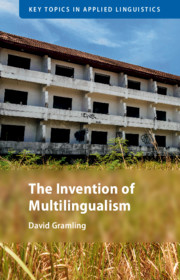Book contents
- The Invention of Multilingualism
- Key Topics In Applied Linguistics
- The Invention of Multilingualism
- Copyright page
- Dedication
- Contents
- Figures
- Preface
- Acknowledgments
- Introduction
- 1 Right-Sizing Multilingualism
- 2 The Problem of Value
- 3 Justice and Injustice
- 4 Hospicing Late Mono/lingualism
- Epilogue The Multilingual Undercommons
- Glossary
- References
- Index
4 - Hospicing Late Mono/lingualism
Published online by Cambridge University Press: 04 June 2021
- The Invention of Multilingualism
- Key Topics In Applied Linguistics
- The Invention of Multilingualism
- Copyright page
- Dedication
- Contents
- Figures
- Preface
- Acknowledgments
- Introduction
- 1 Right-Sizing Multilingualism
- 2 The Problem of Value
- 3 Justice and Injustice
- 4 Hospicing Late Mono/lingualism
- Epilogue The Multilingual Undercommons
- Glossary
- References
- Index
Summary
Chapter 4 acknowledges that even when we are successful at re-enchanting multilingualism, dis-alienating ourselves from “linguanomics” (Hogan-Brun 2017), and delinking from lingualism, monolingualism will nonetheless remain powerful in various forms and intensities, and many of us will remain responsible for its sedimented historical effects on people in our midst. The chapter wagers that the period from now until 2040 constitutes the remainder of what I consider to be an era of late mono/lingualism, a period we might date to the 1948 ratification of the Universal Declaration of Human Rights in the Palais de Chaillot in Paris (Kellman 2016). With more than 600 legally equivalent linguistic versions, the UDHR was an unprecedentedly “omnilingual aspiration” (ibid), which garnered criticism for overreach from Saudi and Iranian spokespeople at the time, as well as from the American Anthropological Association. Such omnilingual ambitions intensified in the 1970s and 1980s with customs deregulation and the implementational phase of neoliberal economic policy, and saw a chaotic, asymptotal boom in the 1990s with algorithmic corpus-driven Machine Translation.
- Type
- Chapter
- Information
- The Invention of Multilingualism , pp. 160 - 200Publisher: Cambridge University PressPrint publication year: 2021



